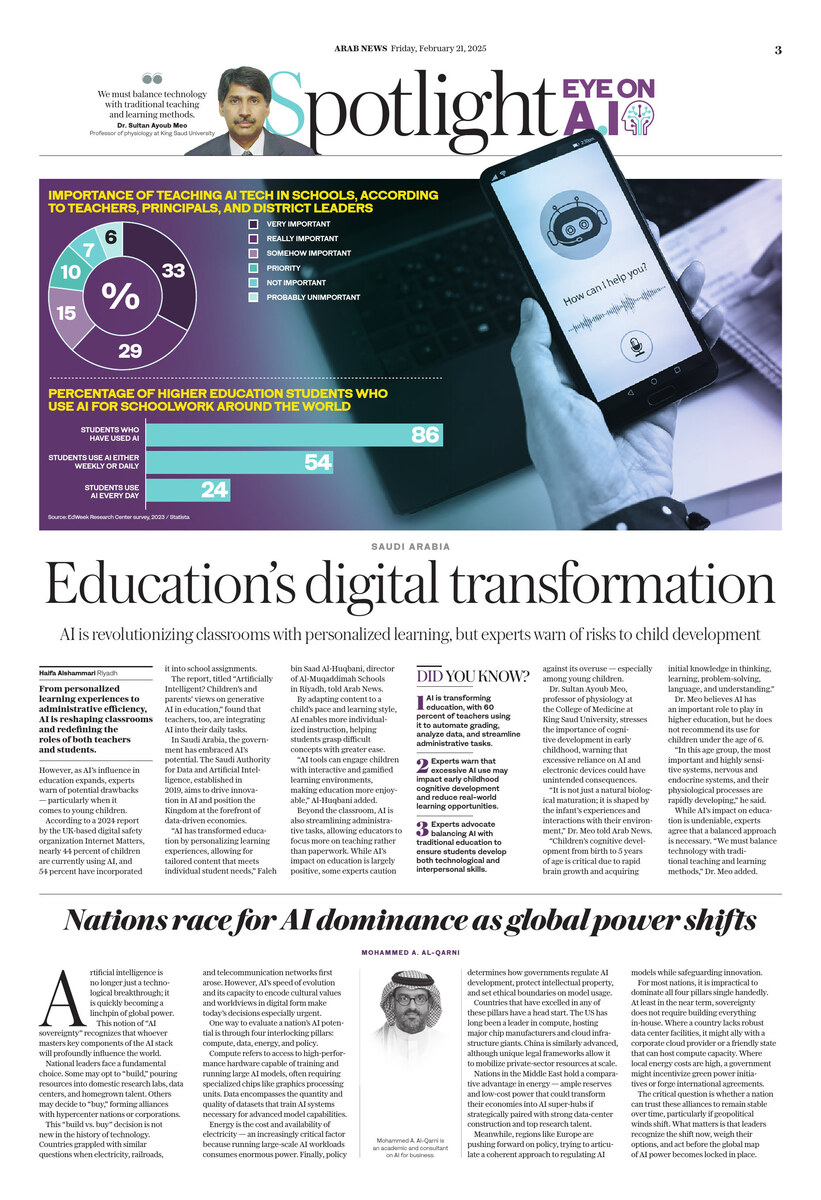RIYADH: Artificial intelligence is revolutionizing industries across the globe, and education is no exception. From personalized learning experiences to administrative efficiency, AI is reshaping classrooms and redefining the roles of both teachers and students.
However, as AI’s influence in education expands, experts warn of potential drawbacks — particularly when it comes to young children.
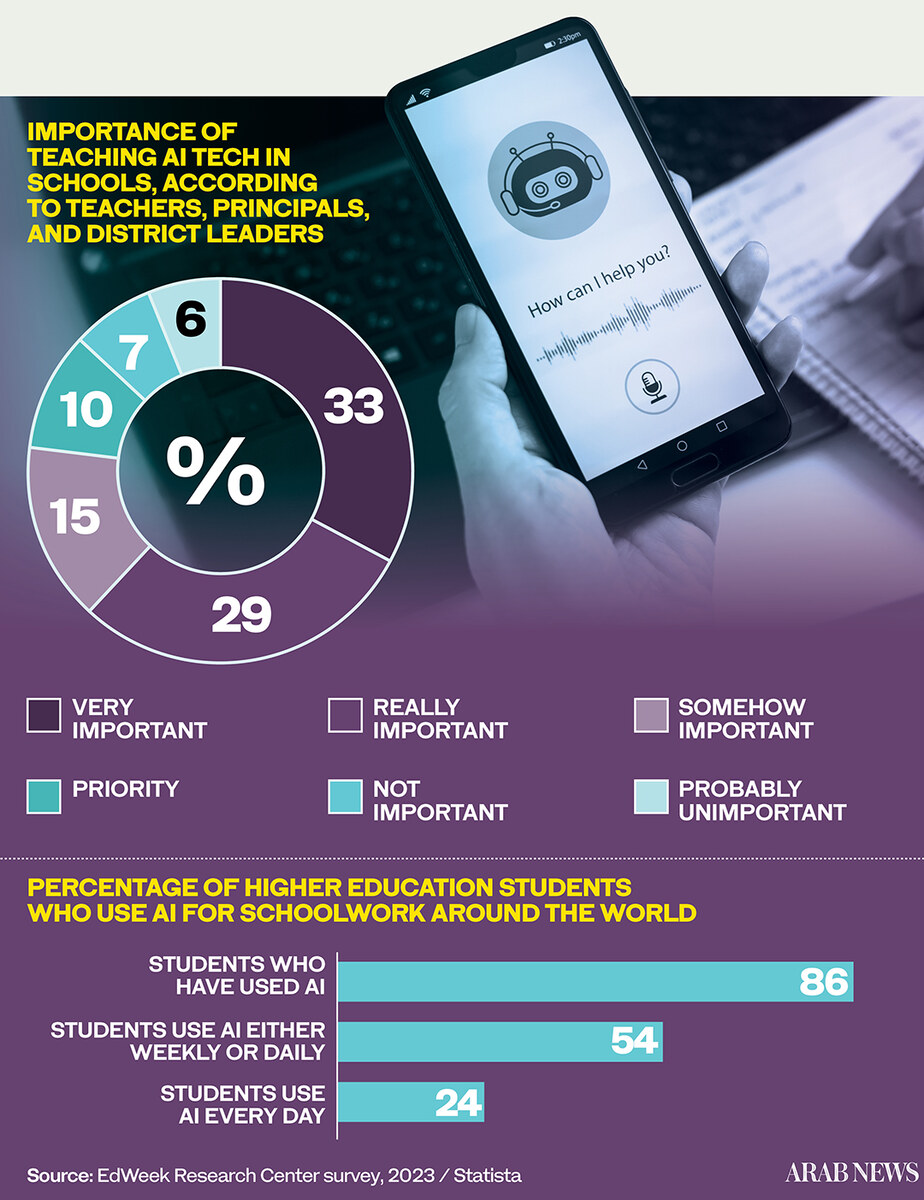
AI-powered tools are becoming increasingly prevalent in education. According to a 2024 report by the UK-based digital safety organization Internet Matters, nearly 44 percent of children are currently using AI, and 54 percent have incorporated it into school assignments.
The report, titled “Artificially Intelligent? Children’s and parents’ views on generative AI in education,” found that teachers, too, are integrating AI into their daily tasks, with 60 percent reporting that they use the technology to enhance their work.
The adoption of AI in education reflects a broader global trend. Experts at Allied Market Research project the market for AI-driven educational tools will grow from $2.5 billion in 2022 to $6 billion by the end of 2025, highlighting the increasing reliance on technology in schools.
Opinion
This section contains relevant reference points, placed in (Opinion field)
In Saudi Arabia, the government has embraced AI’s potential in various sectors, including education. The Saudi Authority for Data and Artificial Intelligence, established in 2019, aims to drive innovation in AI and position the Kingdom at the forefront of data-driven economies.
For educators, AI presents exciting opportunities to enhance learning experiences.
“AI has transformed education by personalizing learning experiences, allowing for tailored content that meets individual student needs,” Faleh bin Saad Al-Huqbani, director of Al-Muqaddimah Schools in Riyadh, told Arab News.
By adapting content to a child’s pace and learning style, AI enables more individualized instruction, helping students grasp difficult concepts with greater ease. Additionally, AI-powered tutoring systems provide real-time feedback and support, reinforcing learning outside the classroom.
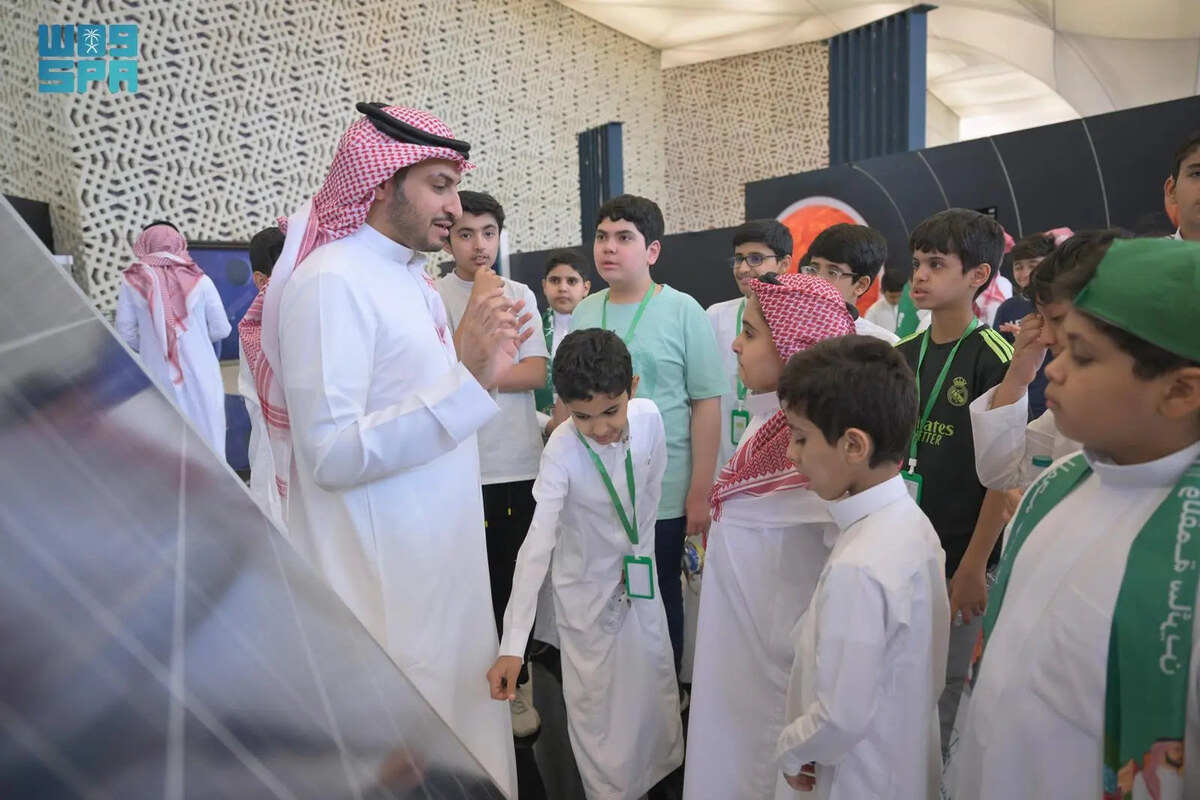
Young students attend a lecture on artificial intelligence and robotics during a science exhibition conducted by the King Salman Science Oasis in Riyadh. (SPA file photo)
“AI tools can engage children with interactive and gamified learning environments, making education more enjoyable,” Al-Huqbani added.
Beyond the classroom, AI is also streamlining administrative tasks, allowing educators to focus more on teaching rather than paperwork. Automated grading systems, data analysis tools, and AI-powered lesson planning are freeing up valuable time for teachers to engage with students more effectively.
While AI’s impact on education is largely positive, some experts caution against its overuse — especially among young children.
Dr. Sultan Ayoub Meo, professor of physiology at the College of Medicine at King Saud University, stresses the importance of cognitive development in early childhood, warning that excessive reliance on AI and electronic devices could have unintended consequences.

Dr. Sultan Ayoub Meo. (Supplied)
“It is not just a natural biological maturation; it is shaped by the infant’s experiences and interactions with their environment,” Dr. Meo told Arab News.
“Children’s cognitive development from birth to 5 years of age is critical due to rapid brain growth and acquiring initial knowledge in thinking, learning, problem-solving, language, and understanding.”
Dr. Meo believes AI has an important role to play in higher education, but he does not recommend its use for children under the age of 6.
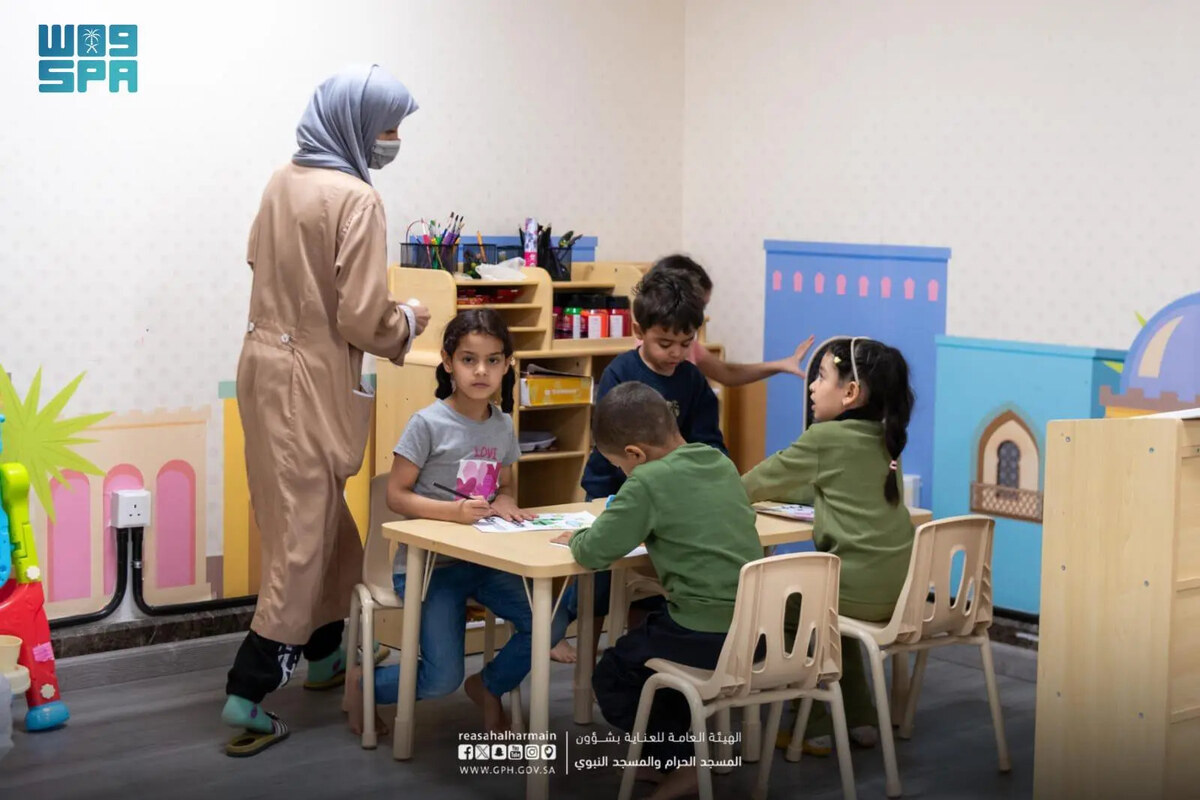
While AI has an important role to play in higher education, Dr. Meo does not recommend its use for children under the age of 6. (SPA file photo)
“In this age group, the most important and highly sensitive systems, nervous and endocrine systems, and their physiological processes are rapidly developing,” he said.
He also pointed out potential health risks associated with prolonged exposure to AI-enabled devices. “Using AI for children at the age of 6 can cause behavioral and psychological issues,” he said.
“We cannot deny the effects of electromagnetic field radiation generated by AI-allied devices and their hazards on various body organs, including the brain, ears, and eyes, especially in infants and children.”
DID YOU KNOW?
• AI is transforming education, with 60 percent of teachers using it to automate grading, analyze data, and streamline administrative tasks.
• Experts warn that excessive AI use may impact early childhood cognitive development and reduce real-world learning opportunities.
• Experts advocate balancing AI with traditional education to ensure students develop both technological and interpersonal skills.
Despite these concerns, Dr. Meo acknowledges that AI is now an integral part of education and research.
“This is the era of science and technology,” he said. “The future of digital education is extremely important in academia and research. Digital education makes knowledge easily accessible and enables students to access the same knowledge resources.”
In addition to making education more accessible, AI facilitates lifelong learning and skill acquisition, helping students meet the demands of an evolving job market. However, Dr. Meo highlighted the importance of being selective in how and when AI is introduced in the classroom.
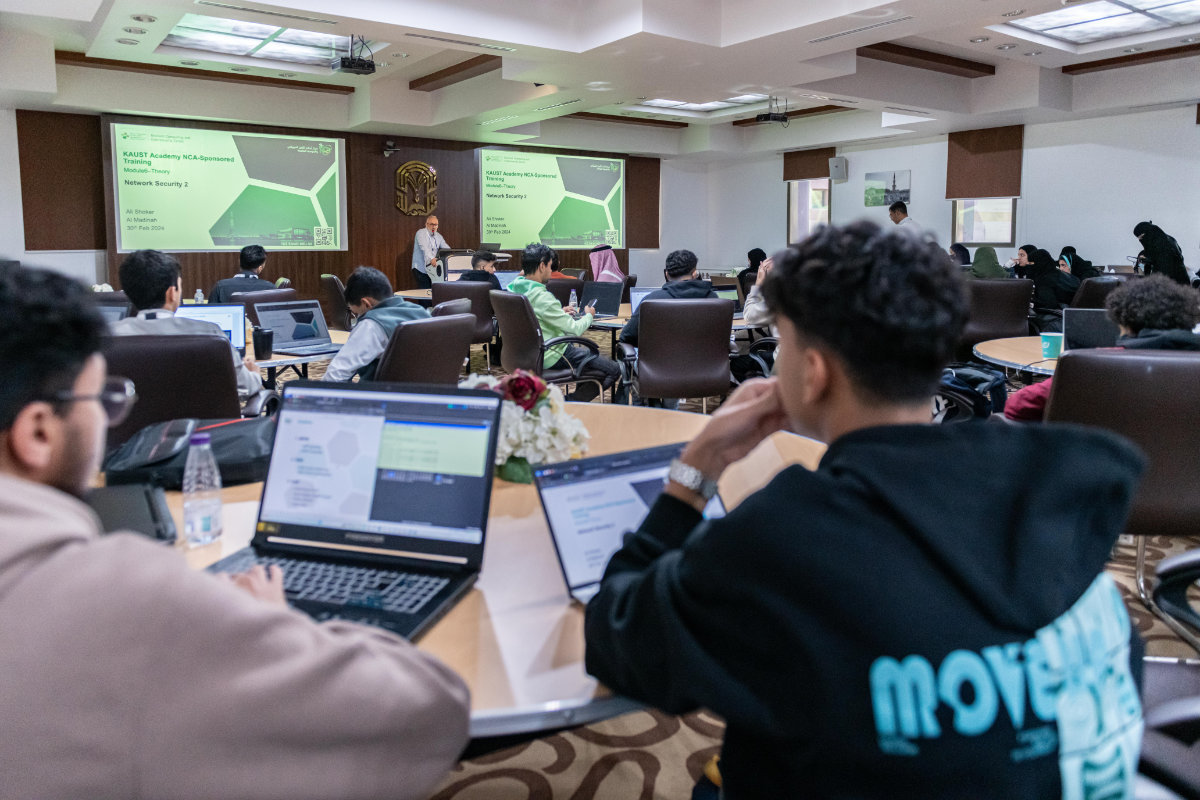
KAUST Academy focuses on talent development in AI with programs targeting outside learners. (Supplied/File)
“It will be helpful at higher school and university levels rather than primary schooling,” he said. “Digital education at primary school levels may replace real-world learning and human interaction.”
While AI’s impact on education is undeniable, experts agree that a balanced approach is necessary. AI should complement, rather than replace, traditional teaching methods, ensuring that students continue to benefit from human interaction and hands-on learning experiences.
“We must balance technology with traditional teaching and learning methods,” Dr. Meo added.
